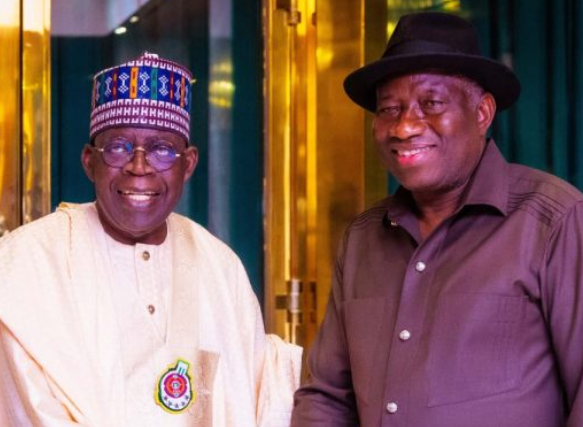Details as Jonathan Meets Tinubu, Discusses Nigeria, ECOWAS Matters
Former President of Nigeria, Dr. Goodluck Jonathan on Friday stated that Nigeria’s recent transition of power qualifies the country to continue to lead Africa’s democratic leadership.
Jonathan averred with elections over, past and present leaders and the electorate must work together for a better future.
His visit is a sequel to the grand finale of the presidential tussle among the trio of the flag bearer of the People’s Democratic Party, Alhaji Atiku Abubakar, Mr. Peter Obi of the Labour Party, and the All Progressives Congress flag bearer and winner of the February 25th, 2023 general election, President Bola Ahmed Tinubu.
In his words, Jonathan affirmed that: “Elections are over, and so we must move forward…Yes, we have challenges economically now, but we still have what it takes to lead Africa,” Jonathan told State House Correspondents after he emerged from closed-door talks with President Bola Tinubu at the Aso Rock Villa, Abuja.
While referring to his active role in peace and diplomacy in West Africa and across the continent, the former President said he has been actively involved in regional dialogues, with plans to visit Kenya and Liberia in the coming days.
“I have been involved in things in West Africa and Africa.
“In fact, tomorrow I will be in Kenya, and on November 14, I will be in Liberia.
“So, I am like a roving Ambassador seeing how we can bring peace to the sub-region and the continent,” said Jonathan.
Though the meeting with President Tinubu was initially scheduled for last week, the former Vice President said it coincided with the recent Supreme Court verdict, which affirmed the victory of President Bola Tinubu at the February polls.
Consequently, he seized the opportunity to congratulate President Tinubu on the outcome.
During the interaction, the former President mentioned that the focus of their discussion was the progress of the nation.
He cited the recent democracy dialogue where Prof Lumumba highlighted Nigeria’s potential leadership role in Africa.
Jonathan also underscored the importance of regular consultations with the current President, particularly when it comes to foreign programmes.
“They are not personal issues,” he clarified, “traditionally, former Presidents, when going outside the country for continental or regional programmes, brief the President upon their return. That is the tradition.”
The former President’s visits to the State House, as he explained, are usually aimed at advancing Nigeria’s interests as well as those of the Economic Community of West African States and the entire African continent.
Commenting on the recent Supreme Court verdict, Jonathan emphasized the need for unity among Nigeria’s political leaders, especially past presidents, saying, “We need to bring all our political leaders together.”
“If top leaders continue fighting, they might not suffer that much, but the downtrodden will,” he cautioned, advocating an end to political tension for the sake of national progress.
Jonathan arrived at the Villa around noon and was received by the President into the closed-door meeting.
Friday’s visit is in continuance of his work as Special Envoy of the Economic Community of West African States, where he is leading mediation talks even as Mali remains under military rule following the August 2020 coup that ousted President Ibrahim Keita.
Recall that in September 2023, the Malian military government announced that it would delay a presidential election scheduled for February 2024, which was aimed at returning civilian rule.
Two rounds of voting, initially set for February 4 and 18, “will be slightly postponed for technical reasons,” said government spokesman Abdoulaye Maiga.
Maiga explained the reasons to include issues related to the adoption of a new constitution and a review of the electoral lists.
He also mentioned a dispute with the French company Idemia, which the government said is involved in the census process.
“The new dates for the presidential election will be communicated later,” Maiga affirmed.
In January 2022, the Economic Community of West African State imposed sanctions on Mali when the Asimi Goita-led junta planned to stay in power for up to five years.
Bowing to pressure from the regional bloc, the junta promised to hold the election in February.
Consequently, the ECOWAS lifted a set of trade and financial sanctions on Mali in July 2022.
PUNCH
